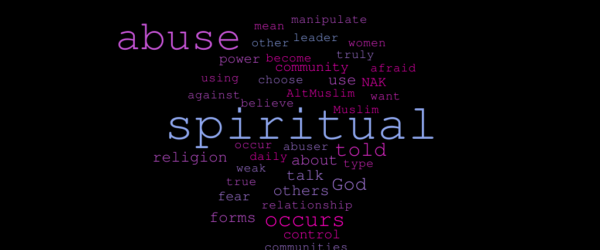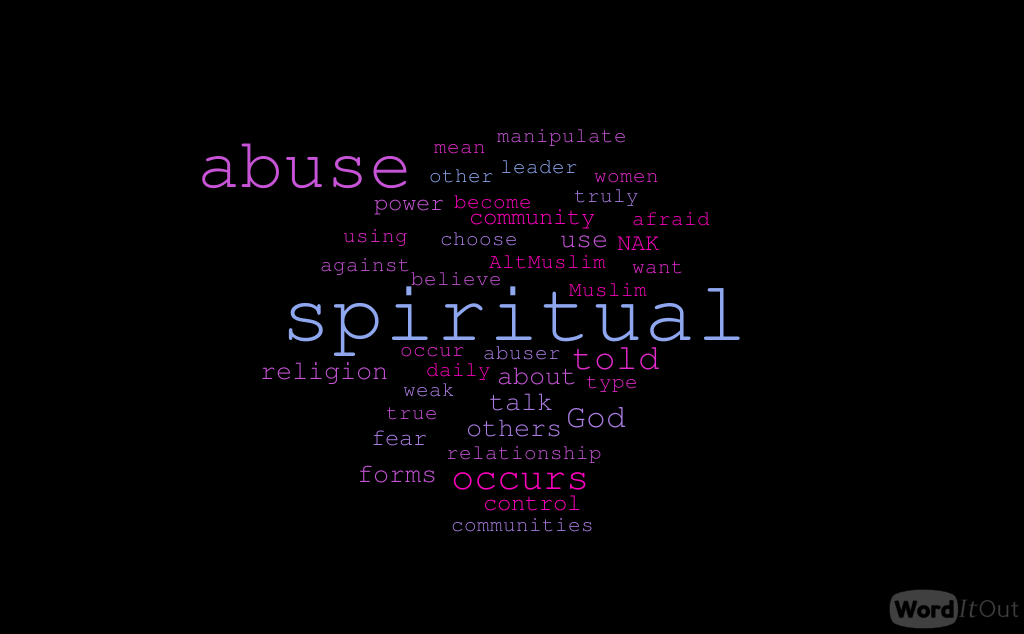This post is related, but only slightly, to the Nouman Ali Khan (NAK) scandal (in which a religious leader used his power to harass and threaten women, as MMW explored in a recent roundtable). I don’t want to talk about NAK, but I do want to talk about the idea of spiritual abuse, a concern which has come to light as a result of the actions of this particular spiritual leader.
Across social media spiritual abuse has been explained as a spiritual leader’s use of their power in the community to control and manipulate followers. AltMuslim recently published a helpful piece on how to recognize a spiritual abuser. They write:
“Spiritual abusers leverage religion as a way of securing personal power over our consciousness. They use God as the basis for their claims against our will, and use the community’s needs as a claim against our rights.”
Additionally they state:
“An imposter or spiritual abuser, on the other hand, is intensely and methodically dedicated to the cultivation of an image, a disguise, a false personality — not necessarily to perhaps conceal their true selves from others but worse, to control them.”
All this is true and as a community we would be wise to heed their words of advice. However, I believe this definition and conceptualization of spiritual abuse is incomplete. In fact, I believe that by omitting other forms of spiritual abuse, our efforts to combat the type of spiritual abuse outlined in the AltMuslim article, will not be useful.
Spiritual abuse is using religion to control or manipulate others’ behaviours and thoughts, and it can be done by anyone. It is using religion to instill a type fear and guilt in others that leads to self-hatred or self-shame. Spiritual abuse occurs when one’s freedom to choose their relationship with God is discouraged and replaced with the imposition of another’s views of how that relationship must be. Spiritual abuse occurs when we use religion to oppress others.
Spiritual abuse can happen when a woman is told that she may choose to either wear the hijab or displease Allah. Spiritual abuse occurs when a non-fasting individual is told they are weak. Spiritual abuse occurs when a Muslim with a mental illness is told their iman (faith) is weak. Spiritual abuse occurs when a wife is told that if she refuses to have sex with her husband she is angering God. Spiritual abuse occurs when children are told that if they misbehave God will punish them. Spiritual abuse occurs when a person who has chosen to become Muslim is, implicitly or explicitly, told they are not “real Muslims.” Spiritual abuse occurs when we are told to truly fear God. And by fear I don’t mean ‘respect’ or ‘obey.’ I mean be afraid, be very afraid of God.
So, can we have an honest discussion on spiritual abuse and how pervasive it truly is in our communities? Can we talk about the daily forms of spiritual abuse that occur? Can we talk about the daily forms of spiritual abuse which have become so normalized that when more extreme forms of spiritual abuse occur our first inclination as a community is to deny they’re even happening, or to blame the victim (because, in case you didn’t notice, NAK has been spiritually abusing women for a long time)?
These questions may seem simple, but we need answers to them. We have too many victims/survivors of spiritual abuse in our communities.



